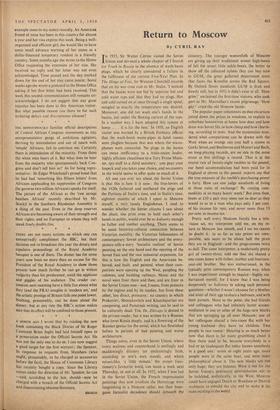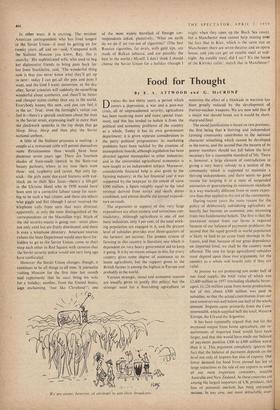Return to Moscow
By CYRIL RAY
IN 1935, Sir Walter Citrine visited the Soviet Union and devoted a whole chapter of 1 Search for Truth in Russia to the absence of wash-basin plugs, which he clearly considered a failure in the fulfilment of the current Five-Year Plan. In The Hinge of Fate, Sir Winston Churchill records that on his war-time visit to Mr. Stalin, 'I noticed that the basins were not fed by separate hot and cold water taps and that they had no plugs. Hot and cold turned on at once through a single spout, mingled to exactly the temperature one desired. Moreover, one did not wash one's hands in the basins, but under the flowing current of the taps. In a modest way I have adopted this system at home . . it is far the best.' In 1958, an English visitor was warned by a British Embassy official that the wash-basin waste-pipes in hotel rooms were plugless because that was where the micro- phones were concealed. No plugs in the basins can mean inefficiency to a trade-union leader, highly efficient cleanliness to a Tory Prime Minis- ter, spy-stuff to a third secretary: you pays your kopeck and you takes your choice, and no country in the world seems to offer quite so much of it.
All one can ever say about the Soviet Union is that this is how it is now: the free-lovers of the 1920s fathered and mothered the prigs and the Puritans of Stalin's time, and in Stalin's time. eighteen months of which I spent in Moscow myself, a very lonely Englishman, I used to wonder whether the Soviet citizens I saw about the place, too prim even to hold each other's hands in public, would ever be ne kulturny enough to father and mother anything. There seems to be some historico-cultural connection between Victorian morality, the Victorian hideousness of contemporary Soviet architecture and the every- picture-tells-a-story 'Socialist realism' of Soviet painting on the one hand and the opening of the Soviet East and the vast industrial expansion, for this is how the English and the Americans be- haved, and built, and painted, when their com- patriots were opening up the West, peopling the colonies, and building railways. Music and the novel were freer there and then, and are freer in the Soviet Union now—not, I mean, from pressure by the regime and by its toadies, but from these other, less direct, pressures : no country in which Prokoviev, Shostakovitch and Khatchaturian are composing, and Pasternak writing, can be said to be culturally dead. Yes, Dr. Zhivago is denied to• the private reader, but it was written by a Russian who loves Russia deeply, and is a flowering of the Russian genius for the novel, which has flourished before in periods of bad painting and worse architecture.
Things move, even in the Soviet Union, where every waitress and counterhand is smilingly and Maddeningly dilatory (or enchantingly Irish, according to one's own mood), and where minutchka, 'a little minute,' the minor func- tionary's favourite word, can mean a week next Thursday, or not at all. In 1952, when I was last in the Soviet Union, the French impressionist paintings that now irradiate the Hermitage were languishing in a Moscow cellar, lest their bour- geois formalist decadence should debauch the citizenry. The younger womenfolk of Moscow are giving up their traditional winter high-boots of felt for smart little ankle-boots, the better to show off the coloured nylons they can buy now in GUM, the great galleried department store that faces the Kremlin across the Red Square. By Oxford Street standards GUM is drab and dowdy still, but in 1952 it didn't exist at all. 'How grim!' exclaimed the first-time visitors, who took part in Mr. Macmillan's recent pilgrimage. 'How gay!' cried the old Moscow hands.
The popular-paper columnists on that excursion jotted down the prices in windows, to explain to suburban housewives at home how dear and how drear was Soviet life, or how cheap and how charm- ing, according to taste. And the economists won- dered what comparisons can be drawn with the West when an orange can cost half a crown in Gorki Street,and Beethoven and Mozart and Bach, on long-playing records, are on sale in the same street at five shillings a record. That is at the tourist rate of twenty-eight roubles to the pound; our hotel accommodation had been paid for in England at eleven to the pound; experts say that the true measure of the rouble's purchasing power is forty. How can one judge standards of living at three rates of exchange? By costing com- modities at so many hours' work? But even then, boots at £10 a pair may seem not so dear as they would to us to a man who pays only 3 per cent. of his income for rent, and never more than 13 per cent. in income tax.
Pretty well every Moscow family has a tele- vision set, my interpreter told me, on my re- turn to Moscow last month, and I see no reason ' to doubt it : in so far as any prices are com- parable, sets seem to be about half the price they are in England—and the programmes twice as dull. The same interpreter, a moderately pretty girl of twenty-three, told me that she shared a one-room home with father, mother and fourteen- year-old brother. She was embarrassed, in the typically prim contemporary Russian way, when I was impertinent enough to inquire—highly em- barrassed myself, for hknew that I was being desperately ne kulturny in asking such personal questions—whether it wasn't irksome for a brother and sister of their age to share a bedroom, and with their parents. More to the point, she had friends and colleagues who had infinitely better accom- modation in one or other of the huge new blocks that are springing up all over Moscow; one of her colleagues shared a two-room flat with her young husband—they have. no children. Two people in two rooms! Housing is so much better now that there is far more grumbling about it than there used to be, because everybody in a bad or an inadequate flat today knows somebody in a good one : seven or eight years ago, more people were in the same boat, and were more philosophical about it, The new blocks are not only huge; they are hideous. Were it not for the Soviet Union's provincial determination not to be indebted, aesthetically, to the West, Moscow could have engaged Dutch or Brazilian or Danish architects to rebuild the city and to make it the most exciting in the world In other ways, it is exciting. The- resident American correspondent who has :lived longest in the Soviet Union—it must be getting on for twenty years, off and on—said, 'Compared with the Stalinist Moscow you knew, Ray, this is anarchy.' His sophisticated wife, who used to beg her diplomatist friends to bring pans back for her from Stockholm, said, 'The wonderful thing now is that you never know what they'll get up to next : today I can get all the pots and pans 1 want, and the kind 1 want; tomorrow, or the day after, Soviet scientists will suddenly do something wonderful about synthetics. and there'll be better and cheaper nylon clothes than any in the world. Everybody knows this now, and you can feel it in the air."f rue : even the fortnight's visitor can feel it—there's a sputnik cockiness about the man in the Soviet street, expressing itself in more than the clockwork sputniks in the toy shops that go bleep, bleep, bleep and then play the Soviet national anthem.
A little of the Stalinist primness is melting :. a couple at .a restaurant table will permit themselves more flirtatiousness than would have been decorous seven years ago. There are fourteen shades of State-made lipstick in the State-run beauty parlours, where in my time there were three: red, raspberry and carrot. Not only lip- stick : the girls paint doe-eyed features with eye- black on to their Slav faces—there's a lift-girl in the Ukraine Hotel who in 1950 would have been sent to a corrective labour camp for seem- ing to be such a bad citizen, and there are others who giggle and flirt (though I never received the telephone calls from tarts that were directed. apparently, at only the most distinguished of the correspondents on the Macmillan trip). Much of the old security-mania is going; too: street plans not only exist but are freely. distributed, and there is even a telephone directory. American tourists (whom the State Department would once have for- bidden to go to the Soviet Union, come to that) snap each other in Red Square with cameras that the Soviet security police would not very long ago have confiscated.
However the Soviet Union changes, though, it continues to be all things to all men. A journalist visiting Moscow fOr the first time last month said rapturously that he must bring his wife for a holiday; another, from the United States, kept exclaiming. 'Just like Cleveland !I; one
We are aware, however, of attempts to jam these broadcasts.
of the most widely travelled of foreign cor- respondents asked, plaintively, 'What on earth do we do if we run out of cigarettes?' (The best Russian cigarettes, fat ovals, with gold tips, are made of Balkan tobacco, and are possibly the best in the world.) Myself, I don't think I should choose the Soviet Union for a holiday (though I might when they open up the Black Sea coast), but a Manchester man cannot help musing over the fact that in Kiev, which is the same size as Manchester, there are seven theatres and an opera house, and you can get an eatable meal at mid- night. An .eatable meal, did I say? It's the home of the Kievskv cutlet : match that in Manchester!



































 Previous page
Previous page